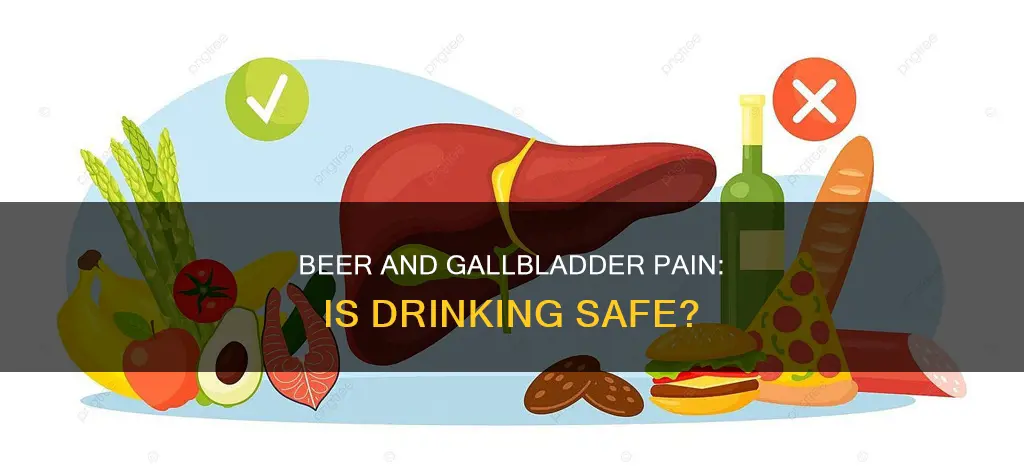
Alcohol can have both positive and negative effects on the gallbladder, and it's important to understand the risks and make informed choices. While moderate alcohol consumption may reduce the risk of gallstones, heavy drinking is associated with an increased risk of gallbladder issues, including cancer and pancreatitis. The impact of alcohol on gallbladder health is complex, and it's crucial to prioritize overall digestive well-being through a healthy lifestyle.
| Characteristics | Values |
|---|---|
| Alcohol consumption and gallbladder pain | Moderate alcohol consumption may reduce the risk of gallstones and gallbladder pain. However, heavy drinking can cause gallstones by leading to cirrhosis. Alcohol can also increase the risk of gallbladder cancer. |
| Alcohol's effect on the gallbladder | Alcohol can affect gallbladder emptying, either by increasing or decreasing the rate. It can also increase cholesterol levels in the bile, leading to gallstone formation. |
| Recommendations | It is generally recommended to drink in moderation, which is up to one drink per day for women and up to two drinks per day for men. |
What You'll Learn

Alcohol may reduce the risk of gallstones but heavy drinking is linked to gallbladder cancer
Alcohol may reduce the risk of gallstones, but heavy drinking is linked to gallbladder cancer. Research has shown that moderate alcohol consumption may help prevent gallstones, which are deposits of substances, often cholesterol, that harden and accumulate in the gallbladder. However, it is important to note that excessive alcohol consumption can lead to negative health consequences that outweigh this potential benefit.
The gallbladder is a small pear-shaped organ located below the liver. It is part of the biliary system, which includes the liver and pancreas, and is responsible for storing and releasing bile, a liquid that aids in the digestion of fats. While alcohol does not directly cause gallstones, heavy drinking can indirectly contribute to their formation through associated liver problems such as cirrhosis. Liver cirrhosis can lead to gallstones due to complications from liver scarring.
Additionally, heavy drinking is linked to an increased risk of gallbladder cancer. This type of cancer is often painless and difficult to detect until it reaches an advanced stage. Other problems associated with the gallbladder include pancreatitis, which can be triggered or worsened by alcohol consumption.
It is worth noting that the link between alcohol consumption and gallbladder health is complex and not yet fully understood. While moderate alcohol consumption may reduce the risk of gallstones, heavy drinking can have negative effects on the gallbladder and overall health. Therefore, it is generally recommended to drink in moderation or avoid alcohol to maintain optimal gallbladder health.
Drinking Beer and Taking SMZ-TMP DS: What You Need to Know
You may want to see also

Drinking alcohol after gallbladder removal
After gallbladder removal, it is generally advised to avoid alcohol initially, but moderate drinking may be acceptable after recovery. The gallbladder does not process alcohol, and alcohol metabolism occurs mainly in the liver with the help of the enzyme alcohol dehydrogenase. However, gallbladder removal surgery is a risk factor for alcohol intolerance. Alcohol can irritate and inflame the pancreas, making it difficult for your body to process alcohol. This is especially true for those with chronic pancreatitis or pancreatic inflammation.
Heavy alcohol intake can also significantly increase the risk of developing gallbladder inflammation, or cholecystitis, and other gallbladder-related issues. Alcohol can interfere with the normal emptying of the gallbladder, leading to a buildup of bile and cholesterol, which can, over time, solidify and form gallstones. Gallstones can cause intense abdominal pain, nausea, and other discomforting symptoms.
If you have undergone gallbladder removal surgery, it is important to be cautious and aware of your body's response to alcohol. You may need to adjust your alcohol consumption and practice moderation to ensure health and well-being. It is also important to stay hydrated, as alcohol can contribute to dehydration.
In summary, while moderate drinking may be acceptable after recovery from gallbladder removal surgery, it is crucial to listen to your body, make informed choices, and seek professional medical guidance if needed.
Beer and Yeast Infections: Is It Ever Safe?
You may want to see also

Alcohol can cause gallbladder pain
Alcohol can indeed cause gallbladder pain. While moderate alcohol consumption may reduce the risk of gallstones, excessive drinking can lead to various health issues, including gallbladder problems and pain.
The gallbladder is a small, pear-shaped organ located in the upper right part of the abdomen, under the liver. It is part of the biliary system, which includes the liver and pancreas, and its function is to store and release bile, a liquid crucial for fat digestion.
Research suggests that moderate alcohol consumption may decrease the likelihood of gallstones. Gallstones are deposits, often made of cholesterol, that harden and accumulate in the gallbladder, affecting 10-15% of people in the United States. While the exact mechanism is unknown, it is theorised that alcohol may increase the rate of gallbladder emptying, thereby reducing the amount of bile available for stone formation.
However, other studies contradict this theory, finding no difference in gallbladder emptying between drinkers and non-drinkers, or even suggesting that alcohol slows down gallbladder emptying. Additionally, excessive alcohol consumption can lead to cirrhosis, a condition where the liver slows down and eventually stops functioning, which can also increase the risk of gallstones.
Furthermore, binge drinking and heavy drinking can have detrimental effects on overall health. Binge drinking is defined as consuming more than 4 drinks for women or 5 drinks for men in a 2-hour period, while heavy drinking involves binge drinking for 5 or more days in a month. Excessive alcohol intake is associated with an increased risk of injuries, violent behaviour, unprotected sex, memory and coordination problems, infections, pancreatitis, liver disease, heart disease, high blood pressure, stroke, certain cancers, and mental health issues such as anxiety and depression.
In conclusion, while moderate alcohol consumption may offer some protection against gallstones, excessive drinking can lead to gallbladder pain and a host of other health issues. Therefore, it is generally recommended to consume little to no alcohol to maintain optimal health.
Beer and Dieting: Can You Have Your IPA and Drink It?
You may want to see also

Alcohol can affect bile production in two ways
It is important to note that while moderate alcohol consumption may help reduce the risk of gallstones, excessive alcohol consumption can have negative effects on health. These negative effects include an increased risk of various health conditions such as liver disease, heart disease, high blood pressure, stroke, and certain types of cancer. Therefore, it is crucial to drink in moderation and be aware of how your body responds to alcohol.
If you are experiencing gallbladder pain or other symptoms, it is always best to consult with a medical professional for personalized advice and treatment options. They can provide guidance and help you make informed decisions about your health, including alcohol consumption.
Warm Beer: To Drink or Not?
You may want to see also

Alcohol can increase the risk of gallbladder disease
While moderate alcohol consumption may reduce the risk of gallstones, heavy drinking can have adverse effects on the gallbladder. Research suggests that alcohol consumption may slow gallbladder emptying, and heavy drinking is linked to an increased risk of gallbladder cancer.
The Impact of Alcohol on the Gallbladder
The gallbladder is a small, pear-shaped organ located in the upper right part of the abdomen, just under the liver. It is part of the biliary system, which includes the liver and pancreas, and its function is to store and release bile, a liquid essential for digesting fats.
Although alcohol does not directly cause gallstones, heavy drinking can indirectly contribute to their formation. Liver cirrhosis, a serious condition linked to alcohol consumption, can lead to gallstones due to complications from liver scarring. Additionally, research suggests that alcohol may slow down gallbladder emptying, providing another link between alcohol and gallstones.
The Risks of Heavy Drinking
Heavy drinking is associated with an increased risk of gallbladder cancer, a serious health concern. It can also cause inflammation in the gut, as the large amounts of alcohol can challenge the gut to process. This inflammatory response can extend to other organs and even become systemic across the entire body.
Recommendations for Alcohol Consumption
While moderate alcohol consumption may offer some protective effects against gallstones, heavy drinking can have detrimental consequences. Healthcare professionals generally recommend consuming little to no alcohol, as it can increase the risk of various health conditions, including liver disease, heart disease, high blood pressure, stroke, and certain types of cancer.
Beer and the Flu: A Safe Mix?
You may want to see also
Frequently asked questions
It is generally recommended to avoid alcohol if you are experiencing gallbladder pain. While moderate alcohol consumption may reduce the risk of gallstones, excessive drinking can lead to negative health consequences, including an increased risk of gallbladder cancer. It's best to consult with a healthcare professional for personalized advice.
Alcohol can affect the gallbladder in several ways. It can increase the risk of gallstones, inflammation, and other gallbladder-related conditions. Additionally, heavy drinking can lead to liver damage, which can indirectly affect gallbladder function.
Symptoms may include abdominal pain, particularly in the upper right quadrant, nausea, vomiting, bloating, indigestion, and jaundice (yellowing of the skin and eyes).
Alcohol may reduce the risk of gallbladder pain by lowering the chances of gallstone formation. However, it is important to note that alcohol increases the risk of gallbladder cancer, which is often painless and challenging to detect.
Moderate alcohol consumption is generally considered safe and may even provide some health benefits. For women, it is recommended to have up to one drink per day, and for men, up to two drinks per day. However, it is important to consider individual health factors and consult a healthcare professional for personalized advice.







